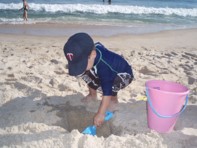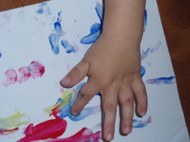by Danielle Carter, MS OTR/L
Sensory play in the preschool and toddler years is such a great way for kids to explore their world, develop tolerance to touch, and learn to be messy! Our touch receptors help us do things such as feel temperature and pain, use the right pressure on a pencil, and reach into a toy box and choose the right toy. Children who have difficulty processing tactile information may either seek out more intense types of touch, or avoid touch. Children who seek touch may have difficulties with personal space, may hit or bite because it feels good to them, and may not understand why this doesn’t feel good to others. Children who avoid touch may struggle with things like seams on clothing or only wear certain types of clothing, may pull away from touch (especially light touch), may have food aversions, and may become irritable in situations where other children might brush up against them.
Exposing your children to tactile sensory play may help your tactile sensitive child (child who avoids touch) learn to process tactile information more efficiently, and help decrease sensitivity. As you play, please keep in mind that our sensory systems are changing throughout our day and a sensory experience that your child is able to tolerate on one day, may overwhelm his nervous system the next day. It is important to let sensory play be child directed and respect their decision to want to take things slowly.
The brain learns to process tactile information in a certain developmental sequence. Introduce dry textures first, then textures that feel messy but do not stick to hands, and finally messy textures that will require hand washing afterwards.
Dry Texture Ideas:
• Uncooked Rice, beans, or dry pasta, unpopped popcorn
• Feathers
• Cotton Balls
• Easter grass
• Autumn leaves
• Ball pit
• Sand paper
Non-Sticky ideas:
• Play-doh
• Floam
• Glurch
• Silly putty
• Kinetic sand
• Water beads
• Cooked noodles
Messy Ideas:
• Shaving cream
• Chalk
• Whipped cream
• Finger paint
• Bubbles
• Making mud pies
• Baking cookies
Please only give these things to children who are no longer mouthing objects for safety reasons. Again, let fun and your child direct this play, respect their wishes when they’d like their hands washed or wiped, and keep sensory play light and fun.



